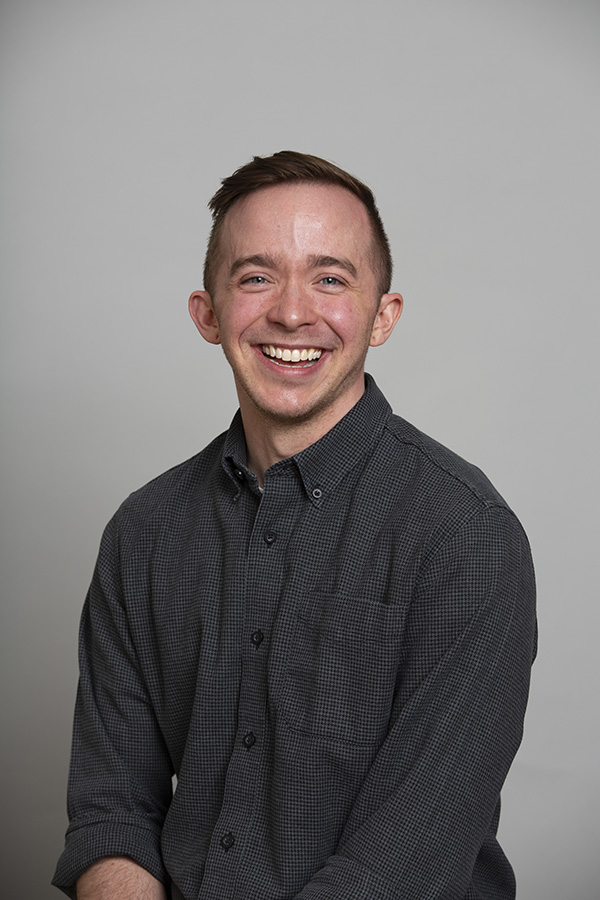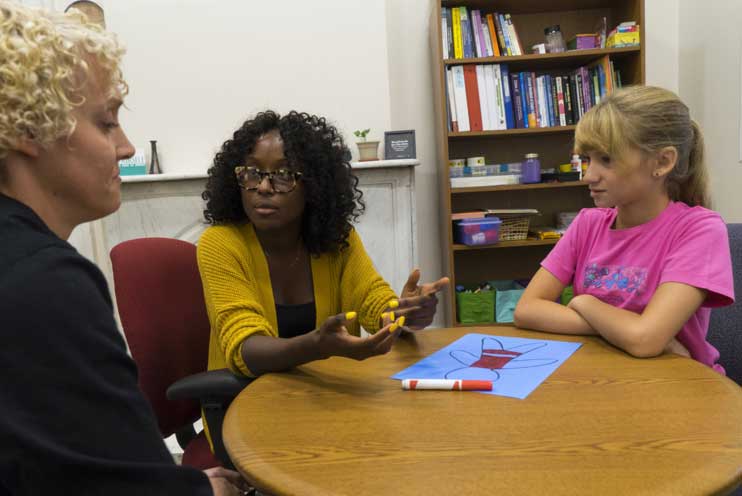
As internship coordinator for the residential master program, Sliker places students in internships; creates internship opportunities with community agencies; supervises students who provide counseling to individuals, couples and families in the Couple and Family Therapy Center at Peck Hall; teaches courses in the department; and supervises transgender and gender diverse support groups through the Gender Expansive Support Team (GEST) created by Associate Professor Deborah Coolhart.
“I love the work that I’m doing, it’s near and dear to my heart, and it affects me professionally and personally–both individually and with the people I love and care about,” Sliker says. “I’ve got a lot of passion for our transgender expansive team and there’s a huge need in our community for working with trans and gender diverse people.”
Sliker’s job, which they started in November, also brings them back home to Syracuse University. A Syracuse native who attended West Genesee High School, they selected the Marriage and Family Therapy Department’s master program because of Coolhart and GEST. Sliker graduated in 2014 after going to school part-time while working full-time at ACR Health as director of the Q Center, which provides a safe space for lesbian, gay, bisexual, transgender, queer and questioning youth, their families and allies.
Following graduation, Sliker worked at Vera House in Syracuse as a therapist for survivors of domestic and sexual violence, and they developed Vera House’s first LGBTQ survivor group specifically for LGBTQ-identified survivors of domestic and sexual violence. They also became a site supervisor for the interns from the Marriage and Family Therapy program who were placed at Vera House.
In their brief time with the Marriage and Family Therapy (MFT) Department, Sliker has made an enormous impact by initiating the transgender and gender diverse support groups and creating new internship opportunities with organizations such as Family Matters, Helio Health, IView, NuStep, Family & Children’s Services of Ithaca, and SUNY Oswego.
“Tyler joined our team full time in the fall of 2021, just as the MFT program was in a state of expansion,” says Tracey Reichert Schimpff, clinical director of the Couple and Family Therapy Center. “We brought in the largest-ever class of residential master students and did not have enough internships in the community to make matches. Due to Tyler’s diligence and connections within the Central New York area, we were able to cultivate placements and provide opportunities for the students in this cohort.
“I appreciate the way Tyler jumped in and worked so hard to meet both student and department needs, Schimpff adds. “Tyler also took initiative to develop support groups for transgender and gender questioning individuals. It was quite successful from the very beginning and met such an important need in the community.”
In this conversation, Sliker explains more about their role as internship coordinator, the importance of the support groups, and the partnerships they’re forming in the community:
Q: Tell us about your role and day-to-day duties.
A: My job is facilitating placement for students out in the community and I develop relationships with a lot of different community placement sites, such as private practices, community agencies, and community clinics. Placing students there and supporting students throughout their placement is the bulk of what I do.
In house, I supervise students here in our clinic, and as part of that I oversee the supervision of our transgender support groups. We offer groups for adults who are trans or gender diverse, teens who are trans or gender diverse, and for the first time ever this past semester we offered a parent caregiver group for parents and caregivers of children who are trans or gender diverse.
Q: How do students get involved in working with the transgender and gender diverse communities?
A: They can participate in what’s called the Gender Expansive Support Team (GEST) and work alongside Deb (Coolhart), who is the lead and one of the clinical supervisors for GEST. My impact on that aspect of the program is the developing of those support groups for trans and gender diverse people.
I’m trans myself, and that’s what informs my interest in this. Having been a trans person growing up in the Central New York community, we didn’t have any trans-specific or gender expansive-specific spaces in the community. So that’s where our clinic really meets a need in the community where there’s a gap.
Q: Why are having those services so important to our community?
A: Not only is the actual violence increasing toward trans people, but the political and legislative violence has also been increasing. These (support) groups have been needed all along, but they’re even more imperative lately. Our community has a number of local schools where queer and trans students have died by suicide, and while that should have never happened, it certainly shouldn’t be happening anymore, especially in 2022.
One of the cool things about our groups is that they’ve been running virtually for most of the time and youth get to participate from all different areas of Central New York, so trans youth get to meet other trans youth that they would not normally cross paths with. If that trans youth is living in with a family in a community where they’re the only trans youth that they know, these groups are a great space to decrease that feeling of “wow, it’s not only me, but other people feel this, too.” These groups run for six or eight weeks and they provide a community where maybe they feel less alone and can talk about things that no one else would really understand what that experience is like.
At the end of the group sessions, we provide information about community resources, in addition to Syracuse University’s resources. And they are welcome to participate in those groups again.
Q: Tell us more about some of the community partners that you’re involved with.
A: One of our community partners is the Q Center at ACR Health. (Q Center Family Peer Advocate) Karen Fuller has regular communication with me and our office coordinator (Anne Metzger-Wormuth) and we share information about what families the Q Center needs to refer to our clinic. The Q Center hosted a meet-and-greet for community partners to meet the staff and the people who work at the Q Center, so of course we relayed that to our students and we had a number of students who attended that event. So, the students who are working in the clinic as part of our program, they’re intentionally going to these opportunities and reaching out to community partners.
A new partner is the Volunteer Lawyers Project (VLP) of CNY and we’re providing services for their team and working with them on serving transgender clients in a helpful and culturally informed way. Our students will also refer our clients to their program because trans clients will often need legal resources for a name change or gender marker change on an identity document.

A: I love working with MFTs (Marriage and Family Therapy students) in the field, and whether it’s a non-profit or community health clinic or private practice, seeing all the different ways MFTs are doing therapy and working with people and families and couples and helping all those different relationships. I love seeing the diversity of what MFTs do in our Central New York community. And then, of course, watching that translate to the diversity of the learning opportunities for our students. Our students get to see such a wide range of things MFTs can do once they graduate, and that is really exciting to me.
Internships at Falk College
In Falk, every undergraduate academic program includes an applied learning requirement, which means you will have career-relevant experiences before you enter the job market. Each department is staffed with dedicated, credentialed internship placement coordinators. Leveraging Syracuse University’s established connections with employers across the U.S., they will help you secure purposeful internship placements that align with your desired degree paths.
